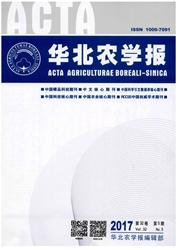

 中文摘要:
中文摘要:
油菜素内酯(brassinosteroids,BRs)是一类重要的植物促生激素,参与调控植物生长发育。最近的研究表明,BRs能增加作物产量和增强作物抗逆性。在BRs信号转导过程中,蛋白激酶的磷酸化功能与转录因子的磷酸化和脱磷酸化过程是BRs信号重要的生化调控机制,其中起始BRs信号由胞外向胞内转导的蛋白激酶BRI1和BAK1,以及BRs信号下游调控不同性状基因表达的转录因子BZR1和BZR2/BES1,是BRs信号途径中关键的功能基因。基于重要蛋白激酶和转录因子的蛋白结构和功能分析,通过不同氨基酸功能位点的基因定点突变和修饰技术,能实现BRs信号途径的功能研究与植物性状改良,从而提高植物对环境的适应性。综述了BRs信号途径与植物生长发育和环境胁迫的研究,期望为植物分子育种提供很好的借鉴。
 英文摘要:
英文摘要:
Brassinosteroids (BRs) is a major plant growth-promoting hormone regulating developmental and physiological processes. The recent studies on BRs indicated that it could increase crop yield and enhance crop resistance to stress. Protein kinase BRI1 and BAK1 initiated outgoing intracellular BRs signal transduction, and the downstream transcription factor BZR1 and BZR2/BES1 were responsible for gene regulation. There were key phosphorylation sites of receptor kinase and TFs responsible for BR signaling, which could be simply manipulated by mutagenesis. Dissect LRR-kinase signal transduction based on protein structure and gene function, and through protein modification based on site-direction mutation can benefit for elucidating BR signaling pathway and network, and eventually improve the plant adaptation for stress environment. This paper summarized studies on BRs signaling pathways and its relationship with plant development and environmental stress, hoping to provide good references for plant molecular breeding.
 同期刊论文项目
同期刊论文项目
 同项目期刊论文
同项目期刊论文
 期刊信息
期刊信息
